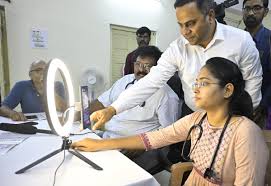In a quiet wing of Niloufer Hospital, one of Hyderabad’s most respected public medical institutions, a quiet but profound transformation in Indian diagnostics is underway. Gone are the vials, syringes, and lab queues — at least for some patients.
Last week, the hospital became the first in the country to roll out an AI-powered, needle-free blood testing tool, capable of analyzing a patient’s vital blood parameters in real time — without drawing a single drop.
The device, developed in collaboration with private-sector health tech engineers and artificial intelligence researchers, uses a combination of non-invasive optical sensors and deep-learning algorithms to assess physiological data and generate on-the-spot diagnostic reports. The goal: painless, immediate, and accurate blood testing, especially for patients for whom blood draws are difficult or traumatic — like children, elderly patients, and the critically ill.
For a hospital that treats thousands of pediatric patients every month, the innovation is more than technological — it is human.
“Children fear the needle, and parents fear the wait,” said Dr. Rajeshwar Tiwari, Head of Diagnostics at Niloufer. “We wanted to remove both.”
The system was trained on thousands of patient datasets to learn how specific optical signals correlate with blood chemistry. After months of clinical trials, hospital administrators say the AI tool has already shown accuracy rates comparable to standard tests — but with none of the invasiveness and a fraction of the time.
While the technology remains in early deployment, with use currently limited to certain departments, officials say it has already begun reducing diagnostic turnaround time and freeing up nursing staff previously tied to phlebotomy and sample transport.
Healthcare experts believe that the rollout marks a significant turning point not just for Niloufer or Telangana — but for how diagnostics might evolve across India’s vast and overstretched health system.
“This is not about replacing labs or doctors,” said Dr. Anuradha Sen, a medical AI researcher familiar with the project. “It’s about giving hospitals one more tool in the fight against delay, discomfort, and diagnostic inequity.”
In a country where public health often battles with long queues, scarce specialists, and rural inaccessibility, non-invasive diagnostics powered by AI could prove to be one of the decade’s most transformative interventions.
For now, at Niloufer Hospital, it’s already changing how patients experience something as simple — and as dreaded — as a blood test.


